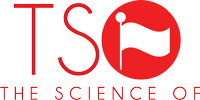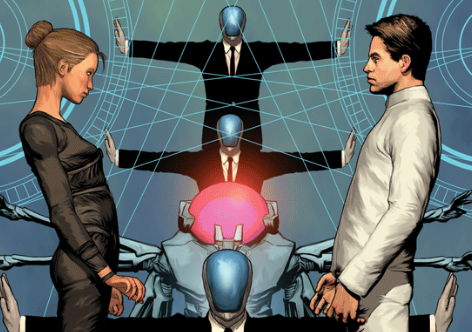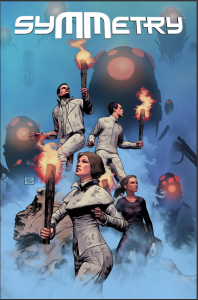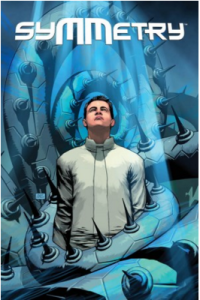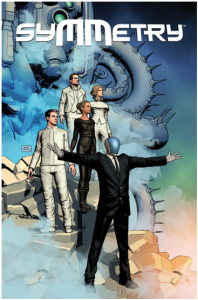Utopia always has a price.
Even a technologically advanced one where all it takes is just a simple solar flare to change the world.
That’s the setup of Symmetry, the latest series created by Matt Hawkins and published by Image Comics.With art by Raffaele Ienco, Symmetry is set in a future where everything seems…perfect.
The series caught our attention thanks to its solid science footing – a common theme with comics written by Hawkins, and kept us for the deeper questions it starts to ask when everything starts to go to hell.
The son of an engineering officer in the Air Force, Hawkins studied Physics and Applied Science at UCLA after a few years at UC Riverside. Hawkins lived the typical military life while growing up – moving every few years – but as schools changed with regularity, Hawkins found something that stayed constant – his love of science and math. Exactly what you’d think a comic book writer and comic book studio President and COO would be well-versed in, right?
“My sister has multiple post-grad degrees in different science fields and she went to work for the California Highway Patrol,” Hawkins said. “Go figure, we’re weird. We’re all fairly overeducated for what we ended up doing. I’ve always had a personal passion with trying to figure out the ‘why’ of things. I had a chemistry set when I was very young and my parents both encouraged me.”
Hawkins was in the mix of the original Image Comics launch back in the early ‘90s before moving to Top Cow where he’s served as President/COO since 1998. Hawkins’ keen eye for the deal and knowledge of the comic book business has kept him in the game as an executive for more than 20 years, while his imagination and storytelling skills have set him apart as a creator. While Hawkins’ early works were somewhat diffuse in regards of genre, moving from fantasy to crime-action and futuristic science fiction, his creative pendulum was been tracing out a more narrow path lately.
While he still works with some franchise properties, Hawkins’ own and co-created properties have taken on a more mature and inquisitive tone as he’s gotten older. His Think Tank pushes at the science boundaries of the world while wondering what one man should do to change the world if he can; The Tithe pokes at organized religion, Postal drinks deep of the darkest recesses of human nature, and Symmetry takes readers into a perfect future…that apparently was only hanging by a thread.
We’re here to talk Symmetry, or more specifically, the science behind the story, which deals with a utopia, a very powerful A.I. named SOL, and the engineering, both technological and social, that’s needed to make such a world work.
Symmetry issues #1 and #2 can be found at your local comic shop or Comixology, and issue #3 hits the same this week.
The Science Of: To start with Matt, and you mentioned it a little in the back of issue #1 – when you settle in to write a story such as Symmetry, there’s a lot of research that goes into it. For this book – what roads did the story take you down?
Matt Hawkins: Studying utopian systems and communist ideology was new for me. Being raised a right-wing conservative Christian it was initially hard for me to not reject it. My more liberal adult self was more embracing once I got past the initial revulsion. It was interesting to read Marx, Engels and study the various attempts at creating even “city utopias” as some have tried. How and why do you build a utopia?
TSO: When it comes to researching something like this, what’s your roadmap? This series isn’t your first go at this kind of story with some in-depth science, so do you have a tried and true plan?
MH: When I have an early idea, I start Googling various things about it. I can usually identify quickly a couple books on the subject that people refer to. I then read those and delve deeper based on the new knowledge. At this point, and this is my favorite part, I’ll reach out to The Science and Entertainment Exchange who connects writers with specialists in various science fields. I’ve met a lot of people that way. One intro they made led me to about ten other scientists I’ve had the pleasure of buying a beer. I also reach out on social media. With the exception of a few known science celebrities (Michio Kaku, Bill Nye, Neil Tyson) the rest are relatively obscure. Even the more published ones may only have a few hundred Twitter followers. My favorite question to answer scientists is what scares them. Their answers are generally stuff I haven’t even heard of. For Symmetry I met with a sociologist who gave me a lot of ideas but asked to remain anonymous.
TSO: What’s your signal that you’ve done enough research and are ready to write?
MH: The research never really stops, but when I feel I’m well-versed in the subject matter I’ll sit down and write an outline. At that point, despite my desire to educate it becomes an exercise in writing character-based fiction that people will hopefully enjoy.
 TSO: Digging in to the world of Symmetry, central to the world was the creation of A.I., and it becoming ubiquitous in the lives of the people of earth. The idea of A.I.’s has taken some hits recently from Hawking and Musk, but yours is benevolent. Tell me about your view on A.I. will it be good or bad for humanity?
TSO: Digging in to the world of Symmetry, central to the world was the creation of A.I., and it becoming ubiquitous in the lives of the people of earth. The idea of A.I.’s has taken some hits recently from Hawking and Musk, but yours is benevolent. Tell me about your view on A.I. will it be good or bad for humanity?
MH: This is the question! Humans are irrational. We make bad decisions all the time for emotional reasons. We’ve reshaped the entire earth to suit our purposes and have wiped out other species on the planet merely for being in our way. So if robots think rationally and not emotionally, is that good or bad? Ultimately, this depends on who’s in charge. If humans control robots or have some form of “off switch” then we’re never in any real danger. In most fictional sci-fi stories where the robots attack us, they become self-aware and decide humans are bad and then try to set us straight. This makes for a good fictional story, but if we’re working hand-in-hand with robots and AI and they are engineered specifically to work with us and have our best interests at heart…would this happen? I really don’t know. I respect Hawking, but at this point he’s just trying to sell books…as am I.
TSO: SOL’s somewhat unique in terms of A.I.s that we’ve seen recently in science fiction – benevolent, a gentle guiding hand to humanity where humans seem to be the true villains in their own utopia. I have to say, both in science fiction and in current commentary, that’s a minority view of superintelligent A.I. Do you really think we could engineer an A.I. like SOL?
MH: It’s the more logical outcome of our efforts. That doesn’t make it a reality, but part of my interest in this story was to challenge that basic preconception of A.I. At this point, we have no basis for believing it other than fiction. So why are we assuming it? And how about channeling more effort into developing it so it doesn’t happen? The problem with humans is that we compete with each other and do not have each other’s best interests in our mind. We’re selfish and egotistical. Robots are none of these things. We like to graft our own imperfections on other things. We anthropomorphize animals all the time in a similar way.
TSO: We tend to both idolize and fear an A.I. Most models of a curious A.I. predict it would have alien, god-like intelligence within a handful of iterations. You seem to be saying, in Symmetry, that perhaps even a created god like SOL can’t create a utopia…
MH: We make irrational decisions based on emotion. We are willing to kill each other over resources, even when there are alternatives available. We do stupid, self-destructive things and a lot of people have no real plan for anything. In my story, which I feel is closer to reality, humans are always the cause of drama and problems.
 TSO: Let’s get into the world-buidling a little. What are some of the things that had to happen in order to lead the world into the “symmetry” it enjoyed prior to the events we see? That is – what’s a timeline look like, technology-wise that gets us from today to Symmetry?
TSO: Let’s get into the world-buidling a little. What are some of the things that had to happen in order to lead the world into the “symmetry” it enjoyed prior to the events we see? That is – what’s a timeline look like, technology-wise that gets us from today to Symmetry?
MH: The backstory of how and why SOL (the main A.I. which stands for System Optimizer for Longevity) came online is the thrust of the second arc of the book so I don’t want to get into it too much. How far off is this in the future from today? I have no idea. Some people say we’re looking at universal A.I and robots doing the bulk of labor in the next 50 years. I doubt that, but it’s certainly viable in the next couple centuries. This story takes place thousands of years in the future.
TSO: Knowing that you keep your finger on the pulse of cutting-edge science for this and Think Tank, you’ve certainly seen the recent stories about DARPA looking to network brains – something that you suggested with your similar creation in Symmetry, RAINA. How far away do you think we are from something like a rudimentary RAINA?
MH: We are already living in an era of the “internet of things” where refrigerators and garage door openers are networked already. Cybernetic enhancements exist with people wearing pacemakers, eye-implants and an increasing array of bio-implanted technologies and peripherals are on the horizon. I dealt with this in my other title Think Tank where you could wirelessly hack someone’s pacemaker and turn it off. We’re looking at brain chips in the next 20-50 years that will replace computers and people will access the internet and communicate that way. Somewhere down the line a brain cap would be introduced, perhaps in utero that would grow with the brain and interface more fluidly with technology. The RAINA (responsive artificial intelligence network archetype) is a liquid inserted into the brain in utero and becomes part of your brain. This is several steps down the line, but entirely feasible…eventually.
TSO: For Symmetry, you move out of say, the hard sciences of Think Tank, and into social sciences with the idea of a utopia. Is the idea of a utopia something that is still being discussed and researched, at least in thought experiments? It seems like it’s always a myth, and deep down we know it’s a myth, yet we all, at times, seem to crave it…
MH: The idea of an egalitarian society is appealing. Especially today with the insane disparity of economic classes. People act like it’s new, but the ultra-rich are just the new nobility. We award wealth in silly ways. We pay entertainers way too much and scientists way too little. The problem with utopia is it flies in the face of what we see as our natural instincts. I’m conflicted. I see the value of a meritocracy or a geniocracy over a democracy or republic. Communism has a bad name and it’s too linked to utopian thought currently to make it truly viable. That may change over time.
TSO: Not to spoil any part of the storyline, but it seems that, for such a utopia to exist as one does in Symmetry, difficult decisions were made that would not, or were not supported by the entire population, resulting in…steps needing to be taken. There is always a cost to utopia, isn’t there?
MH: It’s the age old, do “the needs of the many outweigh the needs of the few” question. Rationally, the answer is yes, but tell that to any minority group. It sucks to be one of the few. It’s clear a lot of steps were taken out of desperation to get this society where it is today. They needed medication to suppress certain emotions. They needed stuff for people to do now that they no longer had jobs. This is what the second volume is about as well. What is your purpose? Is achievement important? In the story there are several updates that are made over time by the system. These are all to enhance the human experience and life.
TSO: In the bigger picture, and going back to the idea of science vs. story, what’s your comfort level with “bending” science a little to serve the purpose of the story? Does everything in your science fiction stories have to be explainable by the science in the world you’re showing, or do the needs of the story sometimes outweigh the needs of the science?
MH: The story always comes first. I fudge a lot and I think with far off sci-fi stuff that’s okay as long as it’s plausible. We really can’t predict what the future will be like. Something could change everything next year and everything we thought we ever knew would be different. What if we found out without a shadow of a doubt that humans originated on another world and were seeded here. Would change a lot. In a book like Think Tank where the lead character is a scientist, I spend a lot more time to make it authentic. I call that a “science thriller”, it’s still fiction of course but it’s all based on real world stuff. This is easier to do because it takes place in the present.
TSO: Finally, Matt – you mentioned in the back of issue #2 that you’re a creative person at heart, not a rebel. You’ve made a niche for yourself in telling science fiction stories – what do you see as the role of the creator or the storyteller in science, and using science to tell stories?
MH: I think this is so important! Kids needs to read science fiction to get inspired to join the sciences. I read a lot of Asimov and Clarke as a kid and if I never had my life would have been very different. Learning and imagination are complementary and I love educators who use this to teach. My favorite classes were always ones that captured my imagination and made me wonder. It’s important for us to see scientists as exciting, interesting and world changing. If you can entertain while clandestinely educating, that’s a win-win.
Symmetry #3 is on sale February 17th; issue #4 is on sale March 16th, and the trade of the first four issues is slated to be in stores on May 25th.
Suggested links from Hawkins:
Utopia:
“Why would anyone want to design a utopia? There are several reasons. The most important is that utopian thought is essential to social change. Without a vision of something better, something that inspires, the chance of social progress is low; and the clearer the vision, the better the chances of achieving it.”
From: Design Your Own Utopia by Chaz Bufe and Libby Hubbard
http://www.seesharppress.com/utopia.html
Utopias in History:
http://www.huffingtonpost.com/2013/08/21/utopias_n_3768023.html
http://www.brainypedia.com/nicetries/utopianprojects.html
http://www.ushistory.org/us/26b.asp
Artificial Intelligence:
http://legacy.earlham.edu/~peters/courses/mm/bestworst01.htm
http://www.livescience.com/49009-future-of-artificial-intelligence.html
http://www.endangeredspeciesinternational.org/overview1.html
http://paleobiology.si.edu/geotime/main/foundation_life4.html
Neural Networks:
http://www.cob.calpoly.edu/~eli/pdf/neural.pdf
http://www.newsweek.com/swarm-intelligence-ai-algorithm-predicts-future-418707

